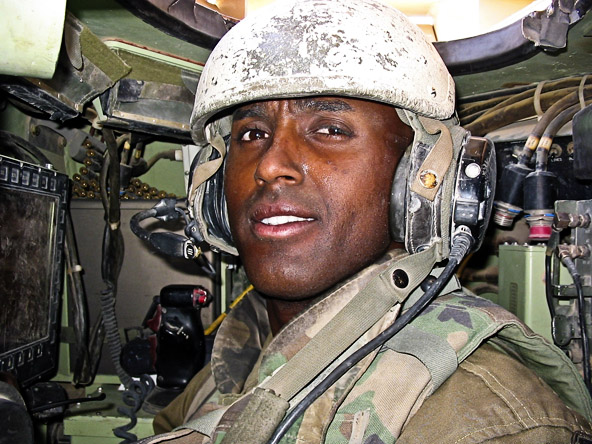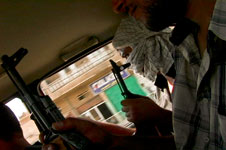
Iraq, 2004. Sergeant First Class, Reggie Butler in a Bradley Fighting vehicle.
Photo: unknown
July 12, 2004 | SADR CITY, BAGHDAD, Iraq
Spotters for the al-Mahdi Army had seen the Americans coming in their convoy and signaled the fighters, who were ready to shoot from alleys and rooftops. As the street cleared out, a heavy soldier named Barron was yelling over to me in the back of the last Bradley. We were inches apart. It was over 100 degrees inside and the air was filled with ochre dust and the sound of the heavy tracks slamming against their metal stops. Barron screamed and pointed at the green screen, one of the few connections to the outside world. "See that? No people. That's bad."
Seconds after he said it, the street around the Humvees disappeared in clouds of dust where the al-Mahdi Army bullets hit the ground. The dust came up around the wheels. It looked like the Humvees were sinking. The heavy guns on the vehicles shuddered. Gunners standing up in the Humvees were returning fire, but it was hard to see if they hit any of the al-Mahdi fighters who were trying to hit the convoy. It was a gun battle on an empty street against invisible men. The U.S. convoy moved on down a few hundred feet and turned a corner. When the firing started again, one of the Bradley commanders spoke in rapid sentences over the radio. "We got some con-tact ..." We kept moving.
When we drove into the ambush, the 1st Cavalry soldiers were on their way to meet the Iraqi police and search an arms dealer's house. As the convoy arrived at the dealer's street, the four Iraqi police trucks slowed down but didn't stop. The Iraqis were supposed to conduct the search while the Americans provided security. Sgt. Reggie Butler, a young African-American in charge of the 1st Platoon, was laughing when he watched the Iraqi police take off. "I was calling over the radio, 'Red 4 to Red 2, you see any IP's? You see any IP's?'" Butler parked his Bradley so that the police couldn't get past the American cordon but they found a way through, inching past the Bradleys on the median. "They squeezed right between us, then eight Humvees went chasing after them."
From the second Bradley, I watched the white police pickups edge past the alley where the arms dealer lived and then disappear, leaving Butler's vehicle exposed to the narrow passage. Butler was blocking the alley when his gunner turned to see an Iraqi pull the trigger on a rocket launcher. With the Iraqi police missing and the locals firing rockets at the convoy, Alpha Company abandoned the cordon-and-search and headed for the base at 50 miles an hour, narrowly missing a roadside bomb. When we got back, I asked Lt. Derek Johnson, the 1st Platoon leader, what happened. He only said, "Yeah, that was a real cluster fuck," and then walked back to his barracks exhausted.
On April 4 when the mass uprisings began across Iraq, Sadr City, which had been relatively calm, suddenly became one of the most violent places in the country. The 1st Cavalry had just taken over a few days earlier and had no idea what to expect. When it
finally happened, the carefully planned Mahdi Army offensive caught them off guard. Sadr City is not like the rest of Baghdad; it has its own identity, a collective mind that can become violent or joyful in an instant. You quickly get the feeling that everyone knows everybody else. It is a poor place but that does not capture it. Sheep graze on the medians, which are heaped with garbage. Thin young men sell black-market gasoline and cigarettes on the sidewalk, and there is the sound of vendors yelling in the white sun. Ruined avenues branch out into thousands of narrow alleyways full of children. When the residents decided to rise up against the U.S., it happened quickly.
Now, after months of continuous fighting, young men in the 1st Battalion, 5th Regiment have experienced some of the highest casualties of any unit in post-invasion Iraq, with a number of soldiers receiving multiple Purple Hearts. Two are still on duty. There's a fatalistic joke going around the barracks that goes, "If you get five Purple Hearts, you get to go home." More than 30 members of Alpha Company have been wounded in action, and those who haven't been describe miraculous near-misses outside the base. For Alpha Company soldiers, these are bad odds, and they get worse in light of the current administration's policy -- fewer U.S. soldiers in Iraq means greater stress for those sent into it, soldiers out on constant patrols, working vast areas of operation. Here, there are fewer than 600 U.S. soldiers patrolling a hostile city of 2 million people.
On April 4 alone, Charlie Company, one of the units that patrols Sadr City, took 17 casualties. Alpha Company, the second unit to be caught in the Mahdi Army offensive, sustained 13 casualties with two deaths. Alpha Company was trying to rescue soldiers from Charlie Company when they were also pinned down by Mahdi fighters. The result of the ambush was a bloodbath. U.S. soldiers were riding in a large open truck that provided no cover from the attack. "That was a bad day," Reggie Butler told me. "Everybody who thought they were hard, they thought again after that."
Living in a permanent state of dread, many of the men in the Alpha Company barracks are distant and sullen, unable to trust a recent lull in the fighting. "I don't like cease-fires," a medic named Andrew Lamkin said. "It just gives them time to prepare." The war in Sadr City has paused for a delicate cease-fire while the Shiite firebrand and leader of the Mahdi Army, Moqtada al-Sadr, maneuvers for leverage with an embryonic Iraqi government. It will start up again whenever he feels he is being ignored. I asked a contact who works as an intelligence officer in the Mahdi Army about the prospects for the cease-fire and he said, "It can break down at any time. Instantly."
Sergeant Reggie Butler's determination to keep his men safe made him a hero of this story, there's no other word for it. After the piece ran, I received sharp criticism from senior officers but I believe it stands on its own.
No One is Going Through What We Are Going Through was originally published in Salon.com.
 LEAD IMAGE: 7 August, 2007, Baghdad, Iraq. Mahdi Army militiamen on patrol in a sector of the city shared by the First Cavalry Division. These men were involved in numerous actions against U.S. forces until a rickety ceasefire took effect. The ceasefire collapsed in late August and the militias under Moqtada al Sadr resumed fighting. Reggie Butler and his unit faced these men over a period of months.
LEAD IMAGE: 7 August, 2007, Baghdad, Iraq. Mahdi Army militiamen on patrol in a sector of the city shared by the First Cavalry Division. These men were involved in numerous actions against U.S. forces until a rickety ceasefire took effect. The ceasefire collapsed in late August and the militias under Moqtada al Sadr resumed fighting. Reggie Butler and his unit faced these men over a period of months.Video Still: Andrew Berends/Storyteller Productions
© Phillip Robertson, 2009-2014.
